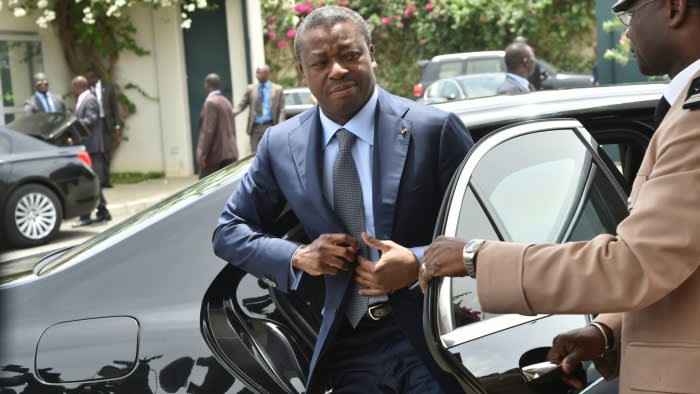Unlock the Editor’s Digest for free
Roula Khalaf, Editor of the FT, selects her favourite stories in this weekly newsletter.
Islamist extremists will have a “devastating” impact in west Africa’s coastal states unless their spread from Burkina Faso and Mali can be prevented, Togo’s president has warned.
Faure Gnassingbé told the Financial Times that jihadis based in Burkina Faso were starting to make incursions into Togo and neighbouring Ghana.
“They’re not organised to hit us but they are inside [our countries],” he said in an interview in London. “If the conflict is not resolved in one country it will spread down to the coastal countries, Togo, Ghana, Cote d’Ivoire. That’s inevitable.”
The threat of violence has been underlined by recent massacres in central Mali between Dogon hunters and Fulani herders, which have stoked fears of jihadis exploiting communal tensions and linking up with ethnic militias.
On Monday, more than three dozen mostly Dogon villagers were reportedly killed in two towns. That followed an attack on another Dogon village the week before that killed 38 people and a March attack on two Fulani villages in which 150 people died.
Burkina’s borders with Togo, Ghana, Côte d’Ivoire and Benin are extremely porous. Last month a Beninoise tour guide was killed during the kidnapping of two French tourists in a national park near the Burkina border.
French troops rescued the pair in Burkina in an operation in which two of their soldiers were killed. France signed an expanded security co-operation agreement with Burkina in December to address the increase in violence.
Last month there were a string of attacks on Christians in Burkina, which the country’s president Roch Marc Christian Kaboré said were a sign of jihadis switching tactics in order to inflame religious tensions, according to local media.
Mr Gnassingbé said that if the “menace” were to spread south, the impact would be severe in small countries such as Togo, whose 8m population is less than half that of Mali and Niger. “That’s why the impact, if it were to start, would be devastating for our countries,” he said.
Defeating the threat was not easy because “no one knows how to deal with it,” Mr Gnassingbé said. It would involve addressing “development issues”, he added, but stressed that “the immediate response has to be military”.
During his time in London, Mr Gnassingbé asked the British government for help to train his military to combat the militants.
France intervened in the Sahel, where it was once the main colonial power, to defeat an Islamist insurgency in northern Mali in 2012. It has retained a presence in the region with 4,500 troops, drones and fighter jets principally operating in Mali, across a territory the size of Europe.
But violence in Mali has surged over the past 18 months and spilled over into Burkina, leading to the collapse of government authority across parts of the country, which was once viewed as a model of stability. The violence has left thousands dead and hundreds of thousands displaced in one of the poorest regions of the world.
When asked if the French troops in the region were helping or hindering the fight against violent Islamist extremism, Mr Gnassingbé said: “I cannot say that they are containing [it] because it’s now in Burkina and threatening Togo.”
The rise of extremism across the Sahel region is largely driven by local grievances. Jihadi groups exacerbate conflicts between farmers and herders and fill the vacuum left by government neglect. That makes the northern reaches of countries such as Togo, Benin and Ghana — far from their coastal capitals — particularly vulnerable.
Source link : https://www.ft.com/content/85aff9ba-919e-11e9-b7ea-60e35ef678d2
Author :
Publish date : 2019-06-22 03:00:00
Copyright for syndicated content belongs to the linked Source.
